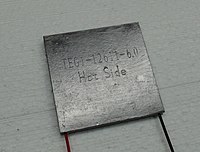
Photo from wikipedia
Modern electronic devices are usually subjected to thermo-mechanical loads and prone to buckle during their operation. Thermo-mechanical stability is a crucial standard for their reliable applications. This paper explores the… Click to show full abstract
Modern electronic devices are usually subjected to thermo-mechanical loads and prone to buckle during their operation. Thermo-mechanical stability is a crucial standard for their reliable applications. This paper explores the size effect on the thermo-mechanical behavior of the organic solar cells. An effective isogeometric analysis method combined with modified couple stress theory is presented. The thermo-mechanical buckling load-bearing capacities of the organic solar cells subjected to various in-plane loadings, temperatures, and geometrical parameters are discussed. Numerical results show that the size effect has significant effect on the thermo-mechanical load-bearing capacity. The stability region changes minimally when the material length scale parameter $$l$$ to cell thickness $$h$$ ratio is less than 0.2, while the stability region increases remarkably when it is larger than 0.2. Notably, if the material length scale parameter increases to its thickness, the stability region increased almost 25 times than that without size effect. Furthermore, the stability region is narrowest if the temperature is uniform across the thickness direction of the cell.
Journal Title: Meccanica
Year Published: 2021
Link to full text (if available)
Share on Social Media: Sign Up to like & get
recommendations!